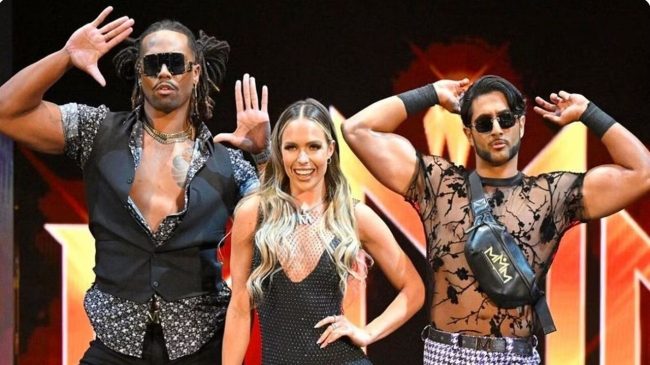
On a recent edition of “The Two Man Power Trip of Wrestling” podcast, former WWE Superstar Mansoor discussed concerns about the Maximum Male Model gimmick being potentially perceived as an LGBTQ+ gimmick by WWE’s partners in Saudi Arabia.
In Saudi Arabia, LGBTQ+ activity is prohibited under law.
Mansoor said, “When Vince came back from his retirement, we were getting messages from the creative team like, ‘Hey, we wanted to put you in this backstage segment, but somebody’s a little concerned that the portrayal of the character may offend certain important partners to the company. So I was kinda reading between the lines.”
Mansoor recalled what Vince McMahon said about their characters at the time. He stated,
“When Vince McMahon told us that we were doing this male model thing, he was very serious, ‘Listen, it’s not a gay thing. Okay. Not a gay thing. You’re metrosexual.’”
The Maximum Male Model gimmick was essentially dropped last year and both Mansoor and Mace were released from their WWE contracts in September.
The Maximum Male Model gimmick in WWE has recently come under scrutiny due to concerns about it being perceived as an LGBTQ+ gimmick by WWE’s partners in Saudi Arabia. This has raised questions about the portrayal of LGBTQ+ characters in a country where LGBTQ+ activity is prohibited by law.
Former WWE Superstar Mansoor discussed these concerns on a recent episode of “The Two Man Power Trip of Wrestling” podcast. Mansoor revealed that when Vince McMahon returned from retirement, the creative team expressed concerns about the character potentially offending important partners to the company. Mansoor stated that he had to read between the lines and understand that the concern was related to the character being perceived as an LGBTQ+ gimmick.
To address these concerns, Vince McMahon reportedly told Mansoor and others involved in the gimmick that it was not a gay thing but rather a portrayal of being metrosexual. This distinction was made to ensure that the character would not be seen as promoting LGBTQ+ themes, which are prohibited in Saudi Arabia.
The Maximum Male Model gimmick, however, did not last long and both Mansoor and his partner Mace were released from their WWE contracts in September. It is unclear whether the concerns about the gimmick’s potential perception in Saudi Arabia played a role in their release.
This situation highlights the challenges faced by WWE and other entertainment companies when it comes to portraying LGBTQ+ characters in countries with strict laws against LGBTQ+ activity. While WWE has made efforts to promote inclusivity and diversity in recent years, it must also navigate the cultural sensitivities and legal restrictions of different countries where it operates.
In Saudi Arabia, LGBTQ+ activity is prohibited under law, and any portrayal of LGBTQ+ characters or themes can be seen as offensive or even illegal. This presents a dilemma for WWE, as it aims to cater to its global audience while also respecting the laws and cultural norms of the countries it operates in.
It is important to note that this issue is not unique to WWE. Many entertainment companies face similar challenges when it comes to LGBTQ+ representation in countries with restrictive laws. Balancing the desire for inclusivity and diversity with the need to comply with local laws and cultural sensitivities is a complex task.
As society continues to evolve and attitudes towards LGBTQ+ rights progress, it is hopeful that countries with restrictive laws will also reconsider their stance. In the meantime, entertainment companies like WWE will continue to face these challenges and make decisions based on a variety of factors, including legal considerations, cultural sensitivities, and audience reception.
The discussion surrounding the Maximum Male Model gimmick serves as a reminder of the complexities involved in portraying LGBTQ+ characters in different cultural contexts. It highlights the importance of understanding and respecting the laws and cultural norms of different countries while also striving for inclusivity and representation.
